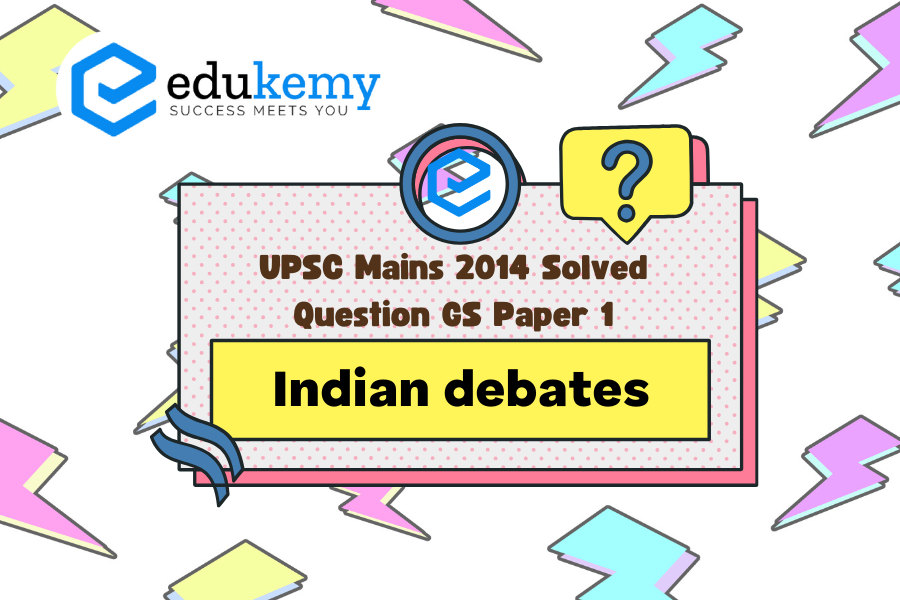The Indian debates on secularism diverge significantly from those in the West due to the unique socio-political context of India. Unlike the Western understanding, where secularism often entails the separation of religion from the state, Indian secularism is characterized by the principle of equal respect and treatment of all religions by the state. This approach stems from India’s history of diverse religious and cultural practices coexisting for centuries. Furthermore, Indian secularism necessitates state intervention to protect minority rights and prevent religious discrimination, which contrasts with the Western emphasis on individual freedom and autonomy. Additionally, India’s secularism faces challenges such as communal tensions, religious politics, and debates over uniform civil code, which are less prevalent in Western societies. Thus, while both contexts grapple with the concept of secularism, the Indian debates are intricately linked to the country’s pluralistic ethos and complex social dynamics.
Tag: Salient features of Indian society.
Contents
Decoding the Question:
- In the Introduction, start your answer by defining secularism.
- In Body, discuss directly how Indian secularism differs from the West.
- Conclude your answer by mentioning the significance of secularism in the society.
Answer:
Indian society and the Western society, at large, have differing sensibilities and understanding of the concept of secularism. This leads to there being a stark difference in the debates surrounding this issue.
Secularism is a doctrine that opposes all such forms of inter-religious domination. The term ‘secular’ was added to the Indian constitution by the 42nd Constitutional Amendment Act of 1976. Indian secularism is different from Western secularism, such as:
| Western-Secularism | Indian-Secularism |
| In the West, the State is separate from the functioning of all religious institutions and groups. | Secularism in India means that the state is neutral to all religious groups but not necessarily separate. |
| The state believes in total non-interference of religion. The state is allowed to curtail the rights of citizens if religion is causing hindrance in the functioning of the state. | In India, the concept is not restricted to the question of how religious groups should be treated. Instead, the essence of secularism lies in forging a positive relationship between the state and religion. |
| The Western concept of Secularism does not believe in an open display of religion except for places of worship. | In India, all expression of Religion is manifested equally with support from the state. |
| The distinction between state and religion is clear and set in stone. | There is no clear distinction between the state and religion in India. |
| The concept of secularism first came about in the mid-17th Century concepts of Enlightenment which were enshrined first in the Constitution of France following the French Revolution (5 May 1789 – 9 November 1799). | Although the concept of secularism was rudimentary practised in ancient and medieval India, the term secularism was enshrined in the Constitution of India with the 42nd Amendment Act, 1976. |
| The state treats all religions with equal indifference. It does not aid any religious institutions through financial means or tax them. | The state gives financial aid to religious institutions and taxes them as well. |
| A single uniform code of law is used to dispense justice regardless of religious background. | Although the law is the same for all citizens, certain personal laws with regard to marriage and property rights are different for every community. But they are all given equal consideration under the Indian Penal Code. |
India’s history has led to a different outcome. There’s no clear demarcation between state and religion in India, with the government being equally invested in all religions. This is why in India, secularism manifests itself by creating an environment where every religion is represented and its followers can freely practice the religion. In a landmark judgement in Bommai case (1994), the Supreme Court upheld the validity of this proclamation on the ground that secularism is a ‘basic feature’ of the constitution. P B Gajendragadkar, a former Chief Justice of India, defined secularism as in the Indian Constitution in the following way: ‘The State does not owe loyalty to any particular religion as such: it is not irreligious or anti-religious; it gives equal freedom to all religions’.
In case you still have your doubts, contact us on 9811333901.
For UPSC Prelims Resources, Click here
For Daily Updates and Study Material:
Join our Telegram Channel – Edukemy for IAS
- 1. Learn through Videos – here
- 2. Be Exam Ready by Practicing Daily MCQs – here
- 3. Daily Newsletter – Get all your Current Affairs Covered – here
- 4. Mains Answer Writing Practice – here


